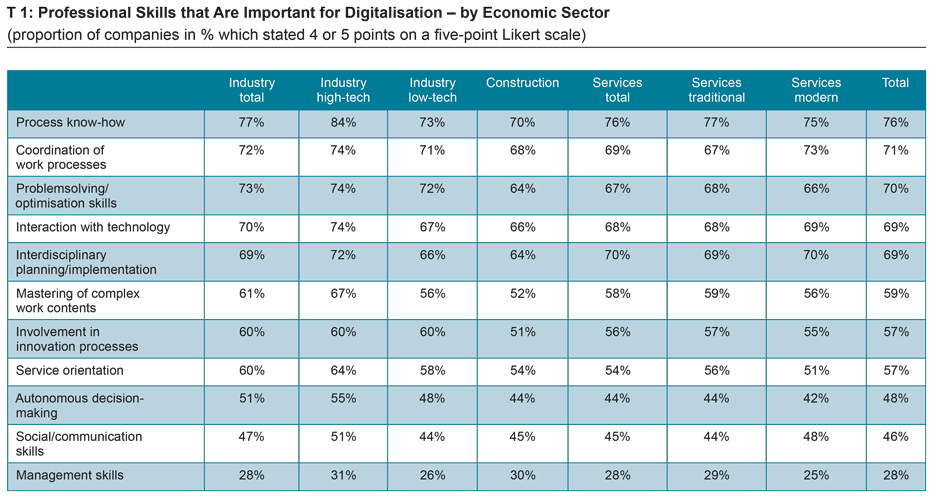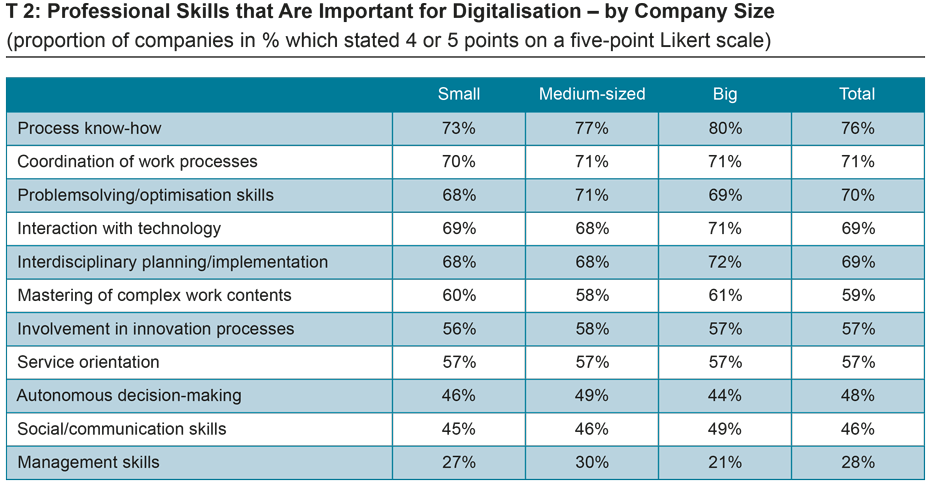Digitalisation (1/2): Companies Consider Lack of Skills Among Staff to be Biggest Obstacle to the Spread of Digitalisation
- Innovation
- KOF Bulletin
In the context of the first representative study on digitalisation, which was conducted in 2016, researchers at ETH Zurich and FHNW investigated the level of digitalisation at Swiss companies. Based on a new assessment of the survey, the first of two KOF Bulletin articles investigates which staff skills companies consider most relevant in the context of digitalisation. The researchers found that many employees actually lack the sought-after skills.

A few years ago, Frey and Osborne (2017) published a study on the susceptibility of US jobs to computerisation. The conclusion they arrived at, which came as a shock to many, was that almost half of all occupations could be automated in the near future. They found the highest potential for computerisation in simple manual and processing jobs as well as complex but standardisable occupations. Conversely, in the face of increasing utilisation of new technologies, sought-after skills among employees are primarily of a creative and socio-emotional nature. In a survey conducted by KOF in collaboration with the Chair of Labour and Organisational Psychology at ETH Zurich, and the University of Applied Sciences Northwestern Switzerland (FHNW), a group of researchers investigated which skills Swiss companies consider necessary to successfully manage the digital transformation. This type of data did not previously exist for Switzerland (SECO, 2017).
35% of the 1,183 participating companies stated that the introduction of digitalisation or more extensive use of computerisation in their company was primarily held back by a lack of available qualifications. All other obstacles, such as unsuitable work processes, costs or technical complexity were quoted with much lower frequency. Hence, a lack of professional skills was identified as the biggest impediment to the spread of digitalisation.
The companies were also asked which skills they considered particularly important. The majority of the respondents mentioned cognitive and organisational skills, such as process know-how (76%), ability to coordinate work processes (71%) and problem-solving and optimisation skills (70%), as very important skills in the context of digitalisation (see table T 1). Further key competences included the ability to interact with technology (69%), interdisciplinary planning and implementation (69%), mastering of complex work contents (59%), involvement in innovation processes (57%) and service orientation (57%). The number of companies considering management skills (28%), social & communication skills (46%) and autonomous decision-making (48%) as relevant skills is significantly lower.
High-tech industries and the construction sector showed the largest variation in their assessments. However, given the wide variety of uses of digital technologies in different economic sectors, the overall picture of the relevance of professional skills is surprisingly homogenous. It is also noticeable that company size seems to make little difference, with the only noticeable variations being the significantly lower number of large companies than SMEs which consider management skills important, and the higher number of big enterprises than SMEs which believe process know-how is important (see table T 2).
The Frey and Osborne study suggests that occupations which require no social skills are more susceptible to automation than those which require a high level of social competence. However, the current ETH Zurich and FHNW survey shows that companies consider social/communications skills among their staff to be less important than cognitive skills. This represents a certain risk for many employees, as their occupations thus seem to belong to areas which are susceptible to computerisation. According to the researchers, the relatively high relevance of cognitive skills quoted by Swiss companies is due to the fact that the more recent versions of digitalisation technologies (e.g. Internet of Things) are still in the early stages in the Swiss economy (cf. Arvanitis et al., 2017) and demand for cognitive skills is therefore higher. Moreover, the preferred forms of work organisation still follow a more traditional-hierarchical pattern. In the future, it is likely that the latest digitalisation technologies will promote the use of flexible, decentralised work forms and decision-making structures (Bienefeld et al., 2018), and that social skills will thus become more important.
Note
This is the first of two Bulletin articles on the new assessment of the digitalisation survey. The second article, which focuses on the corporate objectives that companies have achieved or are aiming to achieve through increased digitalisation, will follow in the March Bulletin.
The KOF study entitled ‘Digitalisierung in der Schweizer Wirtschaft: Ergebnisse der Umfrage 2016, Teil 2: Ziele, Berufliche Kompetenzen und Arbeitsorganisation’ [Digitalisation of the Swiss economy: Results of the 2016 survey, Part 2: Aims, professional skills and work organisation] (2018) by Nadine Bienefeld, Gudela Grote, Irina Stoller, Toni Wäfler, Martin Wörter and Spyros Arvanitis Download can be downloaded here (PDF, 1.1 MB).
Literature
Arvanitis, S., Grote, G., Spescha, A., Wäfler, T. und M. Wörter (2017): Digitalisierung in der Schweizer Wirtschaft – Ergebnisse der Umfrage 2016, eine Teilauswertung im Auftrag des SBFI, KOF Studien Nr. 93, Zürich.
Bienefeld, N., Grote, G., Stoller, I., Wäfler, T., Wörter, M., Arvanitis, S. (2018): Digitalisierung in der Schweizer Wirtschaft: Ergebnisse der Umfrage 2016, Teil 2: Ziele, berufliche Kompetenzen und Arbeitsorganisation, KOF Studien Nr. 99, Zürich.
Frey, C.B. and M.A. Osborne (2017): The Future of Employment: How Susceptible Are Jobs to Computerization?, Technological Forecasting and Social Change, vol. 114, issue C, 254-280.
SECO Staatssekretariat für Wirtschaft (2017). Auswirkungen der Digitalisierung auf Beschäftigung und Arbeitsbedingungen – Chancen und Risiken Bericht des Bundesrates. SECO Publikation Arbeitsmarktpolitik (11. 2017).
Contact
KOF Konjunkturforschungsstelle
Leonhardstrasse 21
8092
Zürich
Switzerland
Contact
Arbeits-& Organisationspsychologie
Weinbergstr. 56/58
8092
Zürich
Switzerland
Contact
Arbeits-& Organisationspsychologie
Weinbergstr. 56/58
8092
Zürich
Switzerland
Contact
No database information available

